Analysis of Lev Vygotsky's Socio-Cultural Theory in Education
VerifiedAdded on 2023/03/31
|5
|894
|285
Essay
AI Summary
This essay provides an in-depth analysis of Lev Vygotsky's sociocultural theory of learning, emphasizing the importance of collaboration, social interaction, language, and culture in cognitive development. It examines how Vygotsky's theory challenges traditional views of learning and highlights the role of the teacher in creating an inclusive environment. The essay explores the practical applications of the theory, including understanding teachers' beliefs about teaching and teacher preparation. It discusses the importance of cultural sensitivity and the need for teachers to adapt their practices to accommodate diverse student backgrounds and perspectives. The conclusion summarizes the key takeaways and emphasizes the theory's significance in shaping effective and inclusive teaching approaches. The essay also references supporting literature to strengthen the arguments.
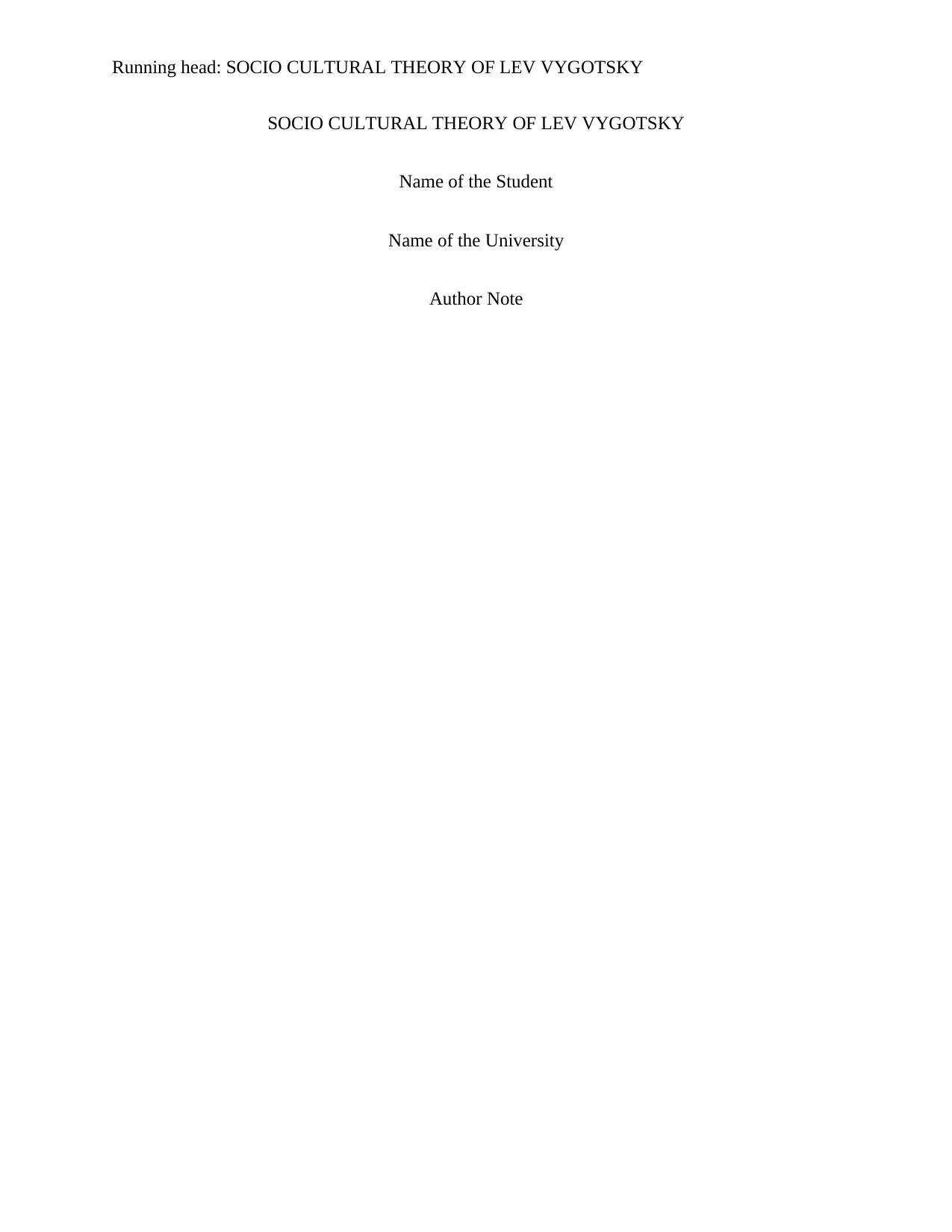
Running head: SOCIO CULTURAL THEORY OF LEV VYGOTSKY
SOCIO CULTURAL THEORY OF LEV VYGOTSKY
Name of the Student
Name of the University
Author Note
SOCIO CULTURAL THEORY OF LEV VYGOTSKY
Name of the Student
Name of the University
Author Note
Paraphrase This Document
Need a fresh take? Get an instant paraphrase of this document with our AI Paraphraser
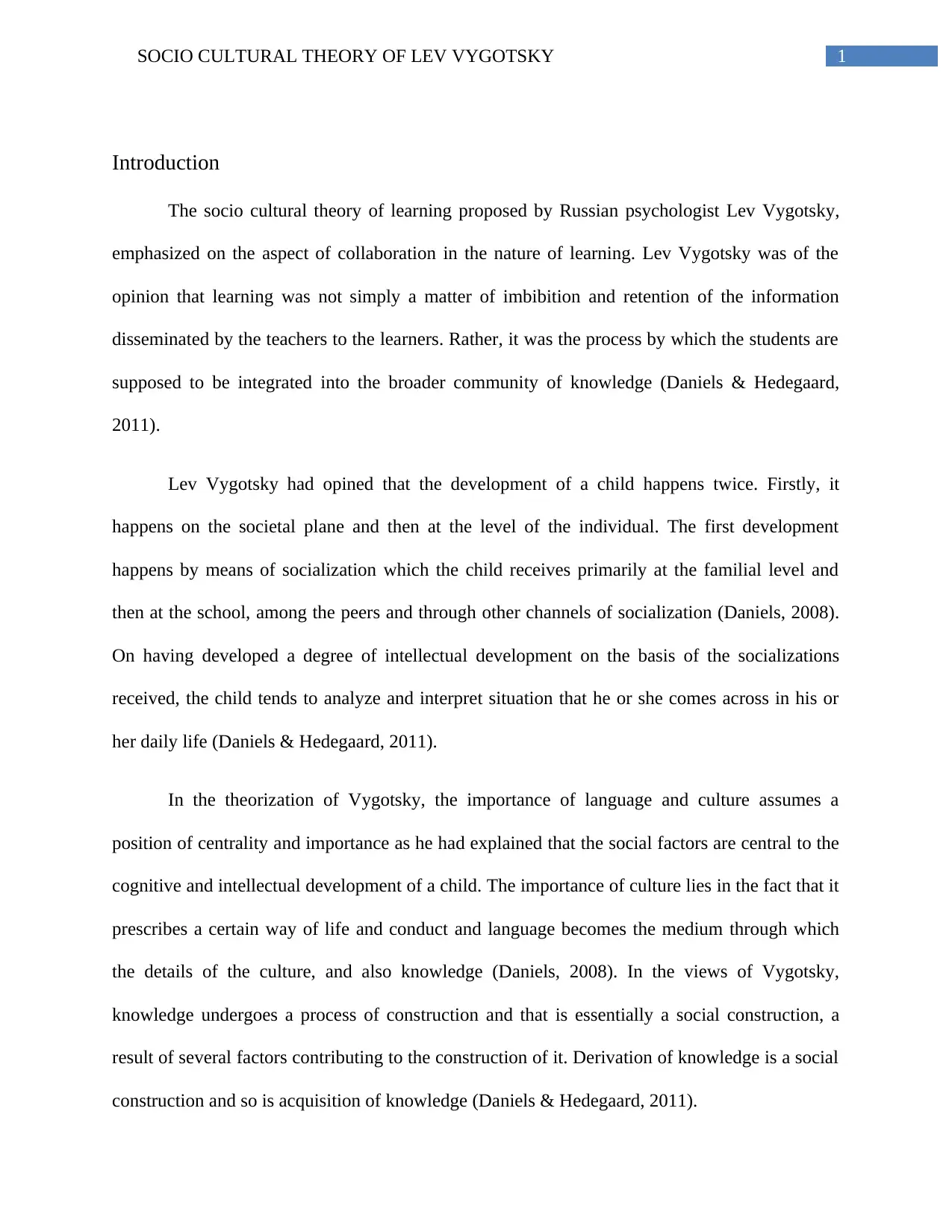
1SOCIO CULTURAL THEORY OF LEV VYGOTSKY
Introduction
The socio cultural theory of learning proposed by Russian psychologist Lev Vygotsky,
emphasized on the aspect of collaboration in the nature of learning. Lev Vygotsky was of the
opinion that learning was not simply a matter of imbibition and retention of the information
disseminated by the teachers to the learners. Rather, it was the process by which the students are
supposed to be integrated into the broader community of knowledge (Daniels & Hedegaard,
2011).
Lev Vygotsky had opined that the development of a child happens twice. Firstly, it
happens on the societal plane and then at the level of the individual. The first development
happens by means of socialization which the child receives primarily at the familial level and
then at the school, among the peers and through other channels of socialization (Daniels, 2008).
On having developed a degree of intellectual development on the basis of the socializations
received, the child tends to analyze and interpret situation that he or she comes across in his or
her daily life (Daniels & Hedegaard, 2011).
In the theorization of Vygotsky, the importance of language and culture assumes a
position of centrality and importance as he had explained that the social factors are central to the
cognitive and intellectual development of a child. The importance of culture lies in the fact that it
prescribes a certain way of life and conduct and language becomes the medium through which
the details of the culture, and also knowledge (Daniels, 2008). In the views of Vygotsky,
knowledge undergoes a process of construction and that is essentially a social construction, a
result of several factors contributing to the construction of it. Derivation of knowledge is a social
construction and so is acquisition of knowledge (Daniels & Hedegaard, 2011).
Introduction
The socio cultural theory of learning proposed by Russian psychologist Lev Vygotsky,
emphasized on the aspect of collaboration in the nature of learning. Lev Vygotsky was of the
opinion that learning was not simply a matter of imbibition and retention of the information
disseminated by the teachers to the learners. Rather, it was the process by which the students are
supposed to be integrated into the broader community of knowledge (Daniels & Hedegaard,
2011).
Lev Vygotsky had opined that the development of a child happens twice. Firstly, it
happens on the societal plane and then at the level of the individual. The first development
happens by means of socialization which the child receives primarily at the familial level and
then at the school, among the peers and through other channels of socialization (Daniels, 2008).
On having developed a degree of intellectual development on the basis of the socializations
received, the child tends to analyze and interpret situation that he or she comes across in his or
her daily life (Daniels & Hedegaard, 2011).
In the theorization of Vygotsky, the importance of language and culture assumes a
position of centrality and importance as he had explained that the social factors are central to the
cognitive and intellectual development of a child. The importance of culture lies in the fact that it
prescribes a certain way of life and conduct and language becomes the medium through which
the details of the culture, and also knowledge (Daniels, 2008). In the views of Vygotsky,
knowledge undergoes a process of construction and that is essentially a social construction, a
result of several factors contributing to the construction of it. Derivation of knowledge is a social
construction and so is acquisition of knowledge (Daniels & Hedegaard, 2011).
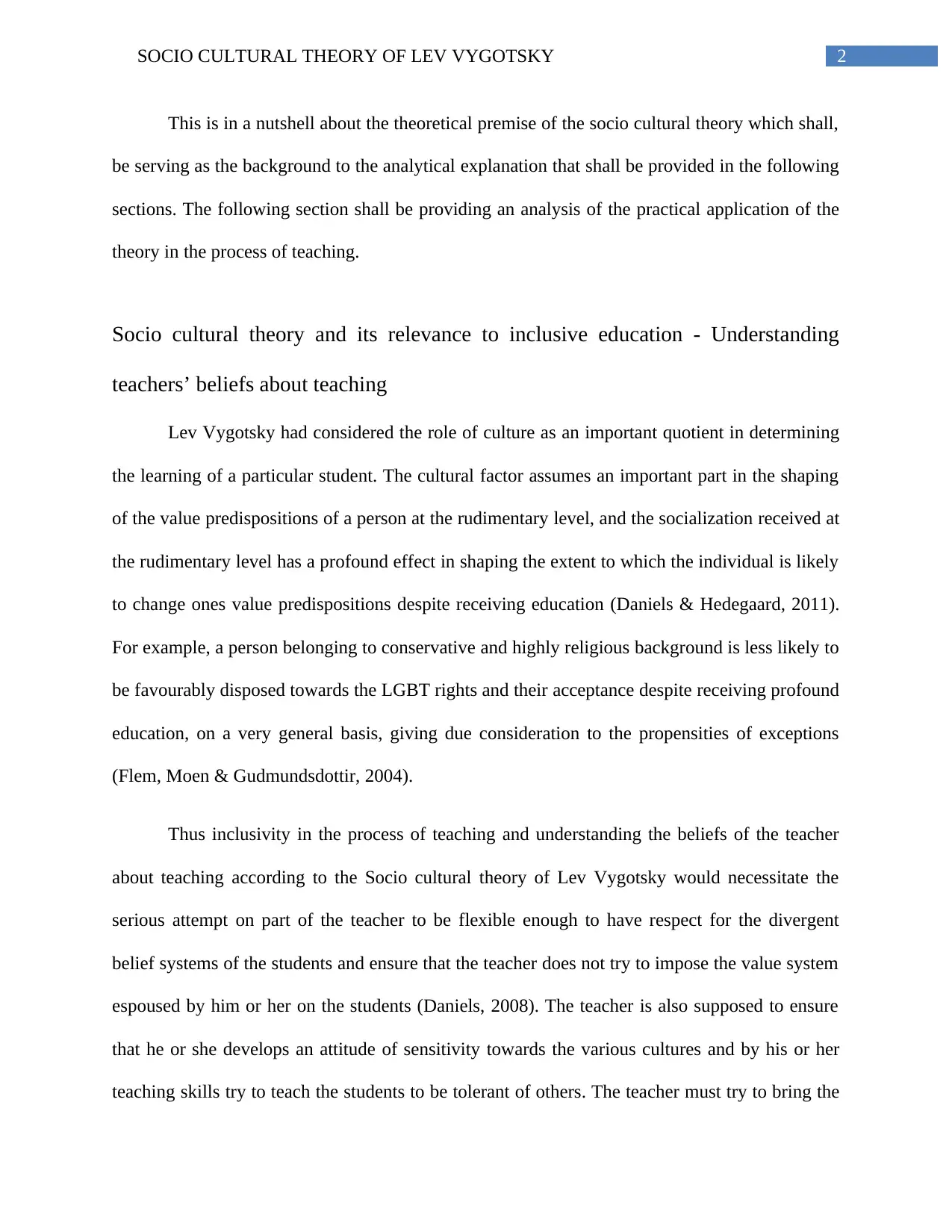
2SOCIO CULTURAL THEORY OF LEV VYGOTSKY
This is in a nutshell about the theoretical premise of the socio cultural theory which shall,
be serving as the background to the analytical explanation that shall be provided in the following
sections. The following section shall be providing an analysis of the practical application of the
theory in the process of teaching.
Socio cultural theory and its relevance to inclusive education - Understanding
teachers’ beliefs about teaching
Lev Vygotsky had considered the role of culture as an important quotient in determining
the learning of a particular student. The cultural factor assumes an important part in the shaping
of the value predispositions of a person at the rudimentary level, and the socialization received at
the rudimentary level has a profound effect in shaping the extent to which the individual is likely
to change ones value predispositions despite receiving education (Daniels & Hedegaard, 2011).
For example, a person belonging to conservative and highly religious background is less likely to
be favourably disposed towards the LGBT rights and their acceptance despite receiving profound
education, on a very general basis, giving due consideration to the propensities of exceptions
(Flem, Moen & Gudmundsdottir, 2004).
Thus inclusivity in the process of teaching and understanding the beliefs of the teacher
about teaching according to the Socio cultural theory of Lev Vygotsky would necessitate the
serious attempt on part of the teacher to be flexible enough to have respect for the divergent
belief systems of the students and ensure that the teacher does not try to impose the value system
espoused by him or her on the students (Daniels, 2008). The teacher is also supposed to ensure
that he or she develops an attitude of sensitivity towards the various cultures and by his or her
teaching skills try to teach the students to be tolerant of others. The teacher must try to bring the
This is in a nutshell about the theoretical premise of the socio cultural theory which shall,
be serving as the background to the analytical explanation that shall be provided in the following
sections. The following section shall be providing an analysis of the practical application of the
theory in the process of teaching.
Socio cultural theory and its relevance to inclusive education - Understanding
teachers’ beliefs about teaching
Lev Vygotsky had considered the role of culture as an important quotient in determining
the learning of a particular student. The cultural factor assumes an important part in the shaping
of the value predispositions of a person at the rudimentary level, and the socialization received at
the rudimentary level has a profound effect in shaping the extent to which the individual is likely
to change ones value predispositions despite receiving education (Daniels & Hedegaard, 2011).
For example, a person belonging to conservative and highly religious background is less likely to
be favourably disposed towards the LGBT rights and their acceptance despite receiving profound
education, on a very general basis, giving due consideration to the propensities of exceptions
(Flem, Moen & Gudmundsdottir, 2004).
Thus inclusivity in the process of teaching and understanding the beliefs of the teacher
about teaching according to the Socio cultural theory of Lev Vygotsky would necessitate the
serious attempt on part of the teacher to be flexible enough to have respect for the divergent
belief systems of the students and ensure that the teacher does not try to impose the value system
espoused by him or her on the students (Daniels, 2008). The teacher is also supposed to ensure
that he or she develops an attitude of sensitivity towards the various cultures and by his or her
teaching skills try to teach the students to be tolerant of others. The teacher must try to bring the
⊘ This is a preview!⊘
Do you want full access?
Subscribe today to unlock all pages.

Trusted by 1+ million students worldwide
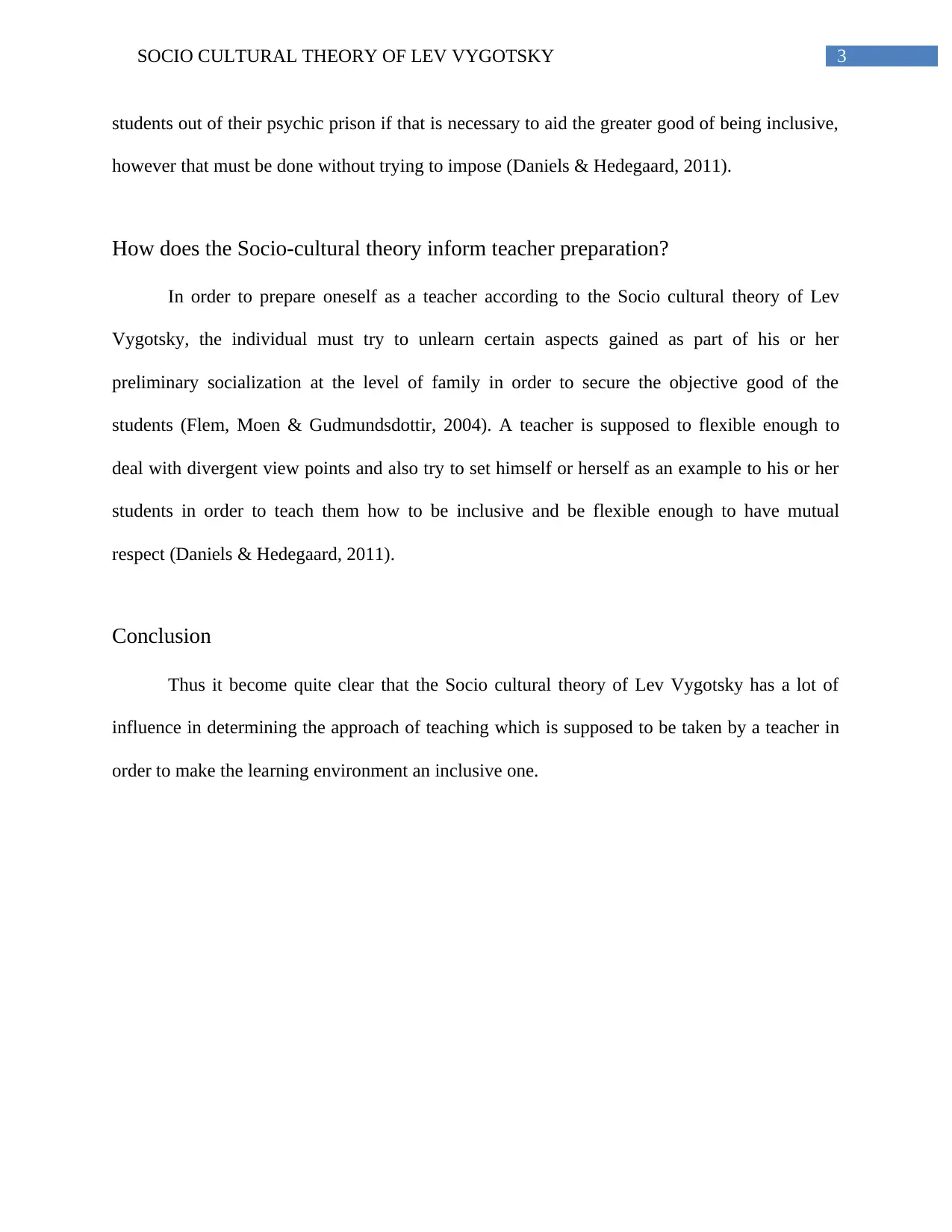
3SOCIO CULTURAL THEORY OF LEV VYGOTSKY
students out of their psychic prison if that is necessary to aid the greater good of being inclusive,
however that must be done without trying to impose (Daniels & Hedegaard, 2011).
How does the Socio-cultural theory inform teacher preparation?
In order to prepare oneself as a teacher according to the Socio cultural theory of Lev
Vygotsky, the individual must try to unlearn certain aspects gained as part of his or her
preliminary socialization at the level of family in order to secure the objective good of the
students (Flem, Moen & Gudmundsdottir, 2004). A teacher is supposed to flexible enough to
deal with divergent view points and also try to set himself or herself as an example to his or her
students in order to teach them how to be inclusive and be flexible enough to have mutual
respect (Daniels & Hedegaard, 2011).
Conclusion
Thus it become quite clear that the Socio cultural theory of Lev Vygotsky has a lot of
influence in determining the approach of teaching which is supposed to be taken by a teacher in
order to make the learning environment an inclusive one.
students out of their psychic prison if that is necessary to aid the greater good of being inclusive,
however that must be done without trying to impose (Daniels & Hedegaard, 2011).
How does the Socio-cultural theory inform teacher preparation?
In order to prepare oneself as a teacher according to the Socio cultural theory of Lev
Vygotsky, the individual must try to unlearn certain aspects gained as part of his or her
preliminary socialization at the level of family in order to secure the objective good of the
students (Flem, Moen & Gudmundsdottir, 2004). A teacher is supposed to flexible enough to
deal with divergent view points and also try to set himself or herself as an example to his or her
students in order to teach them how to be inclusive and be flexible enough to have mutual
respect (Daniels & Hedegaard, 2011).
Conclusion
Thus it become quite clear that the Socio cultural theory of Lev Vygotsky has a lot of
influence in determining the approach of teaching which is supposed to be taken by a teacher in
order to make the learning environment an inclusive one.
Paraphrase This Document
Need a fresh take? Get an instant paraphrase of this document with our AI Paraphraser
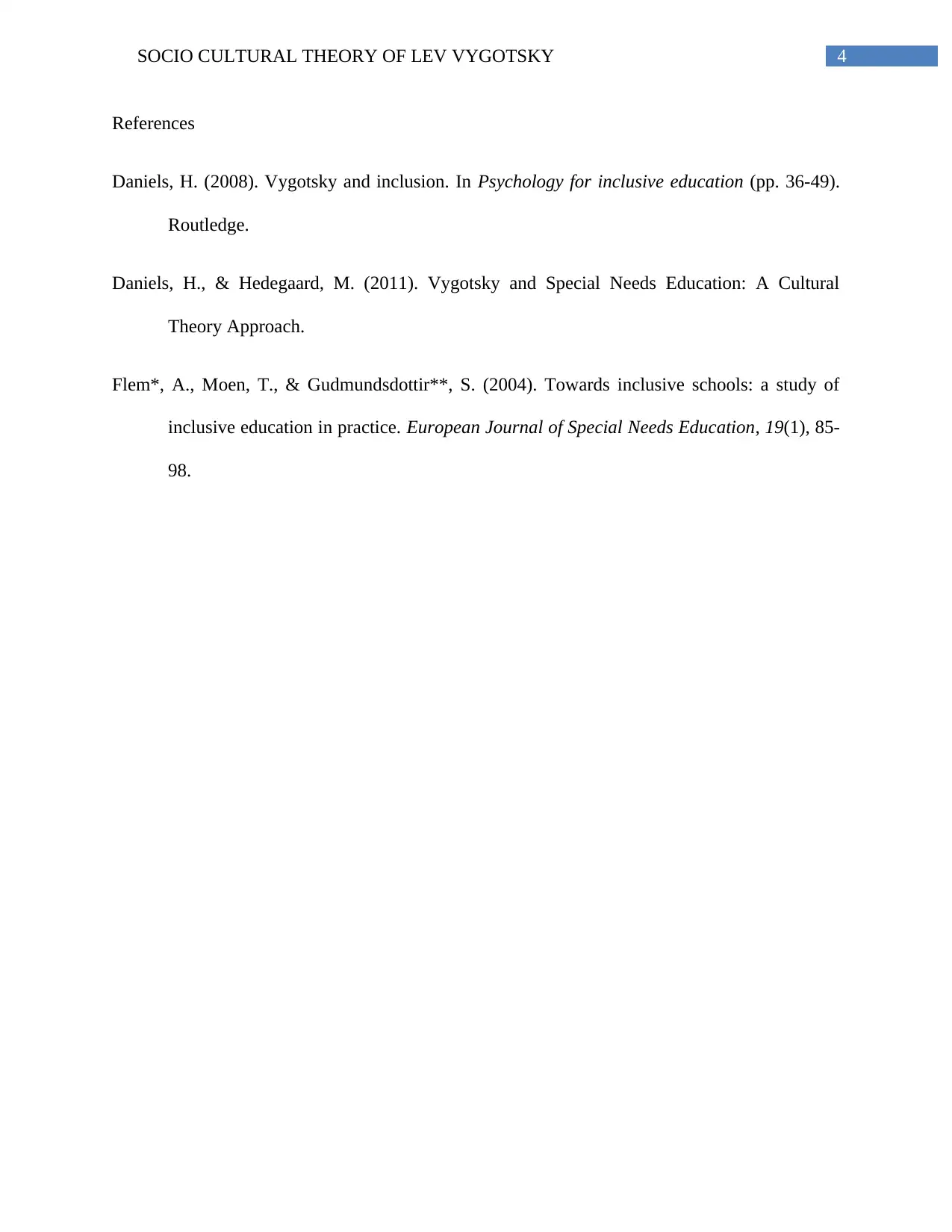
4SOCIO CULTURAL THEORY OF LEV VYGOTSKY
References
Daniels, H. (2008). Vygotsky and inclusion. In Psychology for inclusive education (pp. 36-49).
Routledge.
Daniels, H., & Hedegaard, M. (2011). Vygotsky and Special Needs Education: A Cultural
Theory Approach.
Flem*, A., Moen, T., & Gudmundsdottir**, S. (2004). Towards inclusive schools: a study of
inclusive education in practice. European Journal of Special Needs Education, 19(1), 85-
98.
References
Daniels, H. (2008). Vygotsky and inclusion. In Psychology for inclusive education (pp. 36-49).
Routledge.
Daniels, H., & Hedegaard, M. (2011). Vygotsky and Special Needs Education: A Cultural
Theory Approach.
Flem*, A., Moen, T., & Gudmundsdottir**, S. (2004). Towards inclusive schools: a study of
inclusive education in practice. European Journal of Special Needs Education, 19(1), 85-
98.
1 out of 5
Your All-in-One AI-Powered Toolkit for Academic Success.
+13062052269
info@desklib.com
Available 24*7 on WhatsApp / Email
![[object Object]](/_next/static/media/star-bottom.7253800d.svg)
Unlock your academic potential
Copyright © 2020–2026 A2Z Services. All Rights Reserved. Developed and managed by ZUCOL.
